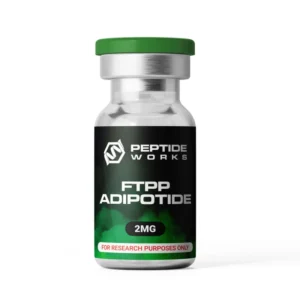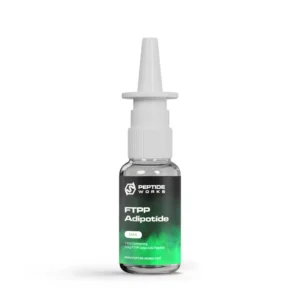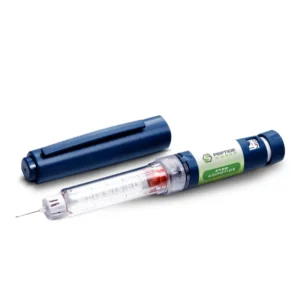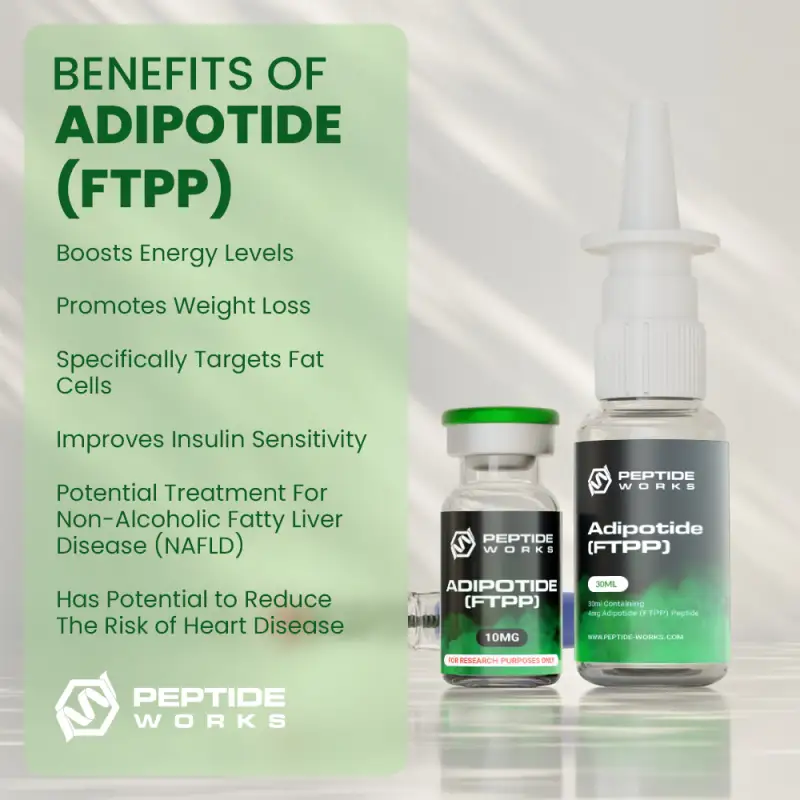PROMO!
First order? Get 10% OFF with this code: 1storder
Our Product Categories



Adipotide is also known as FTPP (Fat-Targeting Proapoptotic Peptide). It is a synthetic peptidomimetic compound with the amino acid sequence CKGGRAKDC-GG-D(KLAKLAK)₂. It was initially developed as an anticancer agent intended to eliminate the blood vessels of cancer cells. Later, scientists found that Adipotide shows a high selectivity for white adipose tissue (fat) due to its capability to bind to specific receptors on blood vessels, primarily prohibitin and annexin A2.
Prohibitin and annexin A2 act as markers on the surface of blood vessels that supply fat tissue, effectively guiding Adipotide to its target. By identifying specific receptors and associating with molecules involved in fatty acid transport, researchers revealed Adipotide’s selectivity for fat tissue. This discovery shifted the focus from cancer treatment to obesity, showing promise in animal studies. In these studies, Adipotide effectively reduced fat mass and improved metabolic health.
Peptide Sequence (IUPAC Condensed): H-Cys-Lys-Gly-Gly-Arg-Ala-Lys-Asp-Cys-Gly-Gly-D-Lys-D-Leu-D-Ala-D-Lys-D-Leu-D-Ala-D-Lys-D-Lys-D-Leu-D-Ala-D-Lys-D-Leu-D-Ala-D-Lys-OH
Molecular Formula: C111H206N36O28S2
Molecular Weight: 2557.2 g/mol
Synonyms: FTPP (Fat-Targeted Proapoptotic Peptide)

Adipotide employs a unique two-part peptide design to target the blood supply of white adipose tissue selectively. The ligand segment binds to specific membrane proteins, such as prohibitin and annexin A2, which are present at high density on the blood vessels feeding adipocytes. This selectivity is also linked to molecules involved in fatty acid transporter activity, crucial for the efficient uptake of fatty acids by fat cells.
The second segment of Adipotide is proapoptotic and disrupts mitochondrial membranes within these targeted vascular cells, leading to apoptosis and the collapse of the vessels. This deprivation reduces blood flow and, therefore, the delivery of fatty acids and other nutrients to adipocytes. As a result, the fat cells shrink and their density within tissue decreases, contributing to overall reductions in body mass index (BMI).
Studies in rhesus monkeys have demonstrated that this targeted approach not only reduces fat cell density and overall fat mass but also leads to improvements in glucose levels and metabolic health. By affecting specific proteins and pathways involved in fatty acid transport, Adipotide offers a novel and precise strategy for reducing adiposity while sparing surrounding tissues.
Buy Adipotide Peptide Vial from Peptide Works. This lyophilized powder is over 99% pure. It is available in 2mg and 10mg vials, supplied as a kit including bacteriostatic water for reconstitution and syringes.
Targeted Fat Reduction: Researchers discovered that the peptide binds to a protein called prohibitin, found in white fat blood vessels. By attaching the proapoptotic peptide to prohibitin, they were able to reduce white fat tissue and reverse obesity in test models without causing harmful side effects. Since prohibitin is also present in human white fat blood vessels, this method could lead to targeted obesity treatments in the future [1].
Enhances Energy Metabolism: Laboratory research suggests it could play a key role in optimizing energy metabolism. Targeting and reducing excess fat tissue enables the body to utilize energy more effectively. Studies indicate that lower fat levels can decrease inflammation and improve mitochondrial function, resulting in higher energy and greater endurance. Moreover, its ability to influence metabolic pathways positions it as a promising solution for combating fatigue and enhancing physical performance. Ongoing studies continue to explore these effects, paving the way for advancements in energy management and metabolic health [2].
A study on mice and rats fed a high-fat diet investigated the impact of targeting blood vessels in fat tissue on obesity and energy balance. The research revealed that reducing body weight was achieved through decreased food intake, without affecting energy expenditure or causing illness. The weight loss happened quickly and was not affected by leptin signaling, even though leptin levels decreased. This reveals a new link between blood vessels in fat tissue and how food intake is controlled, providing new insights into managing obesity [3].
Improved Insulin Sensitivity: Recent research shows that this peptide could improve insulin sensitivity and reduce insulin secretion, offering hope for managing type 2 diabetes [4]. It targets visceral fat, which is closely linked to insulin resistance, helping regulate glucose more effectively. Studies also show that reducing visceral fat decreases inflammation, a key factor in poor insulin signaling. Additionally, it improves mitochondrial function, enhancing energy use and supporting stable blood sugar levels. While more clinical trials are needed to understand its potential fully, these findings suggest it could be a valuable tool in treating diabetes and other metabolic conditions [1].
Buy Adipotide Pre-Mixed Peptide from Peptide Works for research use. The pre-mixed pen kit is available in 2mg cartridges, supplied with a cartridge pen, needle tips, and carry case.
[1] M G Kolonin, P K Saha, L Chan, R Pasqualini, and W Arap (2004) Reversal of obesity by targeted ablation of adipose tissue – Nature Medicine, 2004 Jun, Volume 10 (Issue 6), Pages 625-32.
[2] K F Barnhart, D R Christianson, P W Hanley, W H P Driessen, B J Bernacky, et al (2011) A Peptidomimetic Targeting White Fat Causes Weight Loss and Improved Insulin Resistance in Obese Monkeys – Scientific Translational Medicine, 2011 Nov 9, Volume 3 (Issue 108), Page 108ra112.
[3] D-H Kim, S C Woods, and R J Seeley (2010) Peptide Designed to Elicit Apoptosis in Adipose Tissue Endothelium Reduces Food Intake and Body Weight – Diabetes, 2010 Jan 26, Volume 59 (Issue 4), Pages 907–915.
[4] D-H Kim, M A Sartor, J R Bain, D Sandoval, R D Stevens, et al (2012) Rapid and weight-independent improvement of glucose tolerance induced by a peptide designed to elicit apoptosis in adipose tissue endothelium – Diabetes, 2012 Sep, Volume 61 (Issue 9), Pages 2299-310.

Buy Adipotide Peptide Nasal Spray from Peptide Works. The spray is available in 15ml and 30ml glass spray bottles.
Yes, there have been mild to moderate side effects reported in some preclinical studies, such as nausea, fatigue, and dizziness. More severe side effects, including kidney toxicity, have been associated with long-term use or large doses. Consult a healthcare professional before any clinical research to make the study consistent with the health needs of your test subject. This will support the effective monitoring of potential complications.
It has not yet been approved for human use by the US Food and Drug Administration (FDA). Therefore, you can only buy Adipotide for research purposes. Further clinical trials and testing are needed to prove its safety and effectiveness before it can be approved for widespread use.
Adipotide is currently under investigation as a potential treatment for obesity and metabolic disorders. Preclinical studies in mice and monkeys have demonstrated encouraging results, including significant weight loss and enhanced insulin sensitivity.
Adipotide targets the blood vessels that supply white fat tissue. It cuts off the circulation to the fat cells and causes them to die. This process is called apoptosis and directly helps to reduce the fat tissue. On the other hand, peptides like AOD-9604 work by improving the breakdown of fat and metabolism through a process called lipolysis. This process helps the body burn stored fat for energy. While AOD boosts metabolism, Adipotide targets and breaks down fat tissue directly, offering an innovative approach to treating obesity.

This blog explores fat loss peptides like FTPP Adipotide, AOD-9604, and Tesamorelin, explaining how they work and assessing their effectiveness. These peptides aid fat reduction by triggering lipolysis, breaking down fat, causing fat cell death, and boosting brown fat activity, all while preserving lean muscle. By summarizing key scientific research, the blog highlights their potential for improving fat loss strategies and body composition management.

This blog breaks down the science behind fat-burning peptides like Adipotide (FTPP), AOD-9604, and Tesamorelin. It explains their role in research, focusing on how they affect fat metabolism, promote lipolysis, and support the breakdown of fat cells. By highlighting their potential for targeted fat loss, the blog explores how these peptides could help shape future weight management strategies.

This blog explores the potential of AOD peptides in weight loss research, focusing on their ability to target fat metabolism, maintain muscle mass, improve body composition, and support overall metabolic health. It also discusses clinical trials, appetite control, and how they can help prevent weight loss plateaus.
Excellent Customer Support
Value For Money
99% Pure Guaranteed
World Wide Shipping
ALL CONTENT AND PRODUCT INFORMATION AVAILABLE ON THIS WEBSITE IS FOR EDUCATIONAL PURPOSES ONLY.
DISCLAIMER: These products are intended solely as a research chemical only. This classification allows for their use only for research development and laboratory studies. The information available on our Peptide Works website: https://peptide-works.com/ is provided for educational purposes only. These products are not for human or animal use or consumption in any manner. Handling of these products should be limited to suitably qualified professionals. They are not to be classified as a drug, food, cosmetic, or medicinal product and must not be mislabelled or used as such.